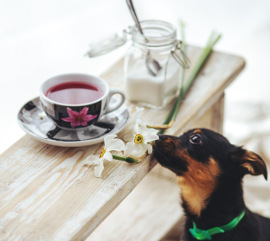 With the holiday season comes a whole slew of tasty festive treats you wouldn’t normally have in your home. This time of year especially, we look forward to visiting and hosting loved ones, but we must be aware of the dangers that some foods pose for our pets. Be on the alert and keep your pets safe this Christmas by avoiding these common food hazards:
With the holiday season comes a whole slew of tasty festive treats you wouldn’t normally have in your home. This time of year especially, we look forward to visiting and hosting loved ones, but we must be aware of the dangers that some foods pose for our pets. Be on the alert and keep your pets safe this Christmas by avoiding these common food hazards:
Chocolate: The darker the chocolate, the greater the risk. Chocolate contains a stimulant known as theobromine, which is toxic for dogs. Baking chocolate, cocoa, and dark chocolates are the greatest risk as they contain higher amounts of theobromine versus milk chocolate or white chocolate. It can take less than one ounce of dark chocolate to poison a 45-pound dog. Depending on the amount consumed, theobromine may cause muscle tremors, irregular heartbeat, seizures, internal bleeding, and even heart attack.
Onions, Garlic, and Chives: Eating these foods can cause symptoms ranging from stomach irritation to red blood cell damage. Onions are the most toxic for dogs and cats, and should be avoided both raw and in cooked dishes. Consuming as little as 0.5% of their body weight in onions can lead to onion toxicosis.
Grapes and Raisins: They may look beautiful on your cheese board, but grapes and raisins are highly toxic for dogs. While the exact substance that causes the toxic reaction is not yet known, what we do know is consumption of grapes and raisins may result in kidney damage, and possibly kidney failure.
Bones: While most raw bones are perfectly safe for dogs, cooked bones are another story. Cooked bones are more likely to splinter or break into shards. Once ingested, splinters may cause serious internal damage. No matter what bone you offer your pet, please make sure it is done under careful supervision.
Raw Bread Dough: As yeasty dough rises, it creates large amounts of gas. This gas can accumulate in a dog’s stomach and digestive system, causing it to expand. Side effects from consumption of raw bread dough range from mild bloating and irritation, to the potentially fatal twisting of the organs, like the stomach (aka bloat). Ethanol created through the fermenting may lead to alcohol poisoning.
Caffeine: Coffee, tea, energy drinks, workout supplements, soda, and diet pills are all commonly found in households everywhere – and they may all contain dangerous levels of caffeine to a dog or cat. Dogs are much more sensitive to caffeine than people are. While consumption of small amounts isn’t likely to cause any serious problems, larger amounts may lead to abnormal heart rhythms, elevated body temperature, seizures, and even death.
Xylitol: Many foods, including those marketed towards diabetics, use xylitol as a low-calorie sugar substitute. In dogs, consumption of xylitol causes copious insulin release, leading to dangerously low blood sugar levels called hypoglycemia. If untreated, hypoglycemia can be fatal. The most common source of xylitol poisoning comes from sugar-free gum.
Alcohol: Alcohol – more specifically ethanol – is more dangerous for dogs than it is for humans. Even in small amounts, alcohol can suppress the central nervous system, and may lead to slowed heart rate, damage to blood cells, and even heart attack. Ethanol is commonly found in not only alcoholic beverages, but also mouthwashes, perfumes, paints, inks, and disinfectants.
Macadamia Nuts: Within about 12 hours of consumption, these holiday treats lead to symptoms ranging from weakness, to vomiting, to body tremors. Ensure nut bowls are not left on coffee tables or other easy access areas. Fortunately, most symptomatic dogs recover without needing any specialized treatment.
Blue Cheeses: While not life-threatening, blue cheeses like Stilton and Roquefort should be avoided as they may cause mild to moderate upset stomach, and pancreatitis in rarer cases.
Enjoy the holidays safely with your pet by keeping potentially dangerous foods out of reach, and ensure your houseguests are aware of these hazards. Make note of your nearest after-hours emergency veterinarian, so you can be prepared in case of an emergency.
Brandon Forder – also known as The Pet Expert – is Vice President of Canadian Pet Connection, a family owned and operated business located in Meaford. He has over twenty years experience specializing in pet nutrition, behaviour, and lifestyle. Canadian Pet Connection is an industry leader committed to providing their clients with the highest levels of personal, attentive service. Learn more at www.CanadianPetConnection.com.









